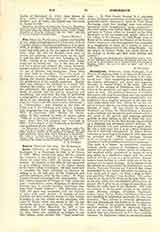

Bus, CESAR DE, VENERABLE, a priest, and founder of two religious congregations, b. February 3, 1544, at Cavailion, Corntat Venaissin (now France); d. April 15, 1607, at Avignon. At eighteen he joined the king’s army and took part in the war against the Huguenots. After the war he devoted some time to poetry and painting, but soon made up his mind to join the fleet which was then besieging La Rochelle. Owing to a serious sickness this design could not be carried out. Up to this time de Bus had led a pious and virtuous life, which, however during a sojourn of three years in Paris was changed for one of pleasure and dissipation. From Paris he went back to Cavaillon. Upon the death of his brother, a canon of Salon, he succeeded in obtaining the vacated benefice, which he sought for the gratification of his worldly ambitions. Shortly after this, however, he returned to a better life, resumed his studies, and in 1582 was ordained to the priesthood. He distinguished himself by his works of charity and his zeal in preaching and catechizing, and conceived the idea of instituting a congregation of priests who should devote themselves to the preaching of Christian doctrine. In 1592, the “Pretres seculiers de la doctrine chretienne”, or “Doctrinaires”, were founded in the town of L’Isle and in the following year came to Avignon. This congregation was approved by Pope Clement VIII, December 23, 1597. Besides the Doctrinaires, de Bus founded an order of women called “Fillies de la doctrine chretienne” and later Ursulines. Pope Pius VII declared him Venerable in 1821. Five volumes of his “Instructions familieres” were published (Paris, 1666).
C. A. DUBRAY

